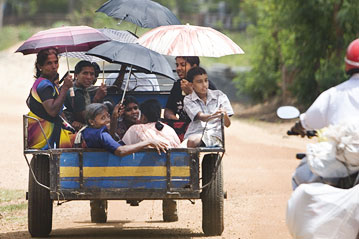Number of Sri Lankans fleeing fighting passes 200,000 mark
Number of Sri Lankans fleeing fighting passes 200,000 mark

GENEVA, August 25 (UNHCR) - The number of Sri Lankans displaced within their country by fighting this year has passed the 200,000 mark, with an additional 8,700 having fled to India, the UN refugee agency said Friday.
"Over the last few days, as our staff has gained greater access to areas of the country previously cut off by fighting, we have dramatically revised the number of people who have had to flee their homes," UNHCR spokeswoman Jennifer Pagonis told reporters in Geneva on Friday.
She said the number of people displaced since fighting flared in April between government forces and the rebel Liberation Tigers of Tamil Eelam (LTTE) now stands at 204,602.
Humanitarian agencies are still not able to reach all of the sites where displaced families are sheltering, Pagonis said. But she added that "UNHCR is pleased that agencies are now able to move into Muttur town" - an area that has been at the centre of fighting in the north-eastern district of Trincomalee. A joint UN mission is assessing security and immediate needs in Muttur, to make sure the right kind of aid gets to displaced people.
Conditions in Kanthale, which hosts most of the families who fled from Muttur, are improving. Local authorities have identified new sites where displaced communities can be housed in emergency shelters, freeing up the schools and other public buildings where they have been sheltering.
In the north, the people of Jaffna town have been granted improved freedom of movement following a recent relaxation in daytime curfews, which allows residents five hours to buy food and other essential items. However, significant numbers of displaced persons are still trapped on the islands off Jaffna peninsula, awaiting much-needed assistance.
"UNHCR is working hard to gain access to these areas as soon as possible," Pagonis said.
Fighting on the Jaffna peninsula flared on August 11 and two weeks later people are still on the move when curfew hours and a lull in fighting permit. Road, sea and air links to the outside world have been cut, though a vessel carrying food supplies was allowed to dock off the peninsula's Point Pedro and began unloading the aid on Friday.
UNHCR protection officer, Johnny Lee Park, was unable to venture out of Jaffna town until five days after the fighting began. He came across an old man whose earthly belongings had slipped onto the road as he was trying to flee from the fighting. "I helped the man put his things back on his bike," said Park.
"That day, for every person I could help, there must have been hundreds more that I could not reach," said Park. "We had water ready to give to people we met on the roads, I even gave the shoes off my feet [to a barefoot teenage boy]." Most people are fleeing on foot, with a lucky few on tractors.
Despite the fighting and curfews, the refugee agency has been able to hand out sleeping mats, jerry cans, lanterns and other essential items to people on the peninsula. UNHCR trucks have also delivered 30-50 tonnes of food on behalf of the UN World Food Programme.

Meanwhile, in addition to the people displaced within Sri Lanka, another 8,742 Sri Lankan refugees have arrived in India since the start of the year.
"After five people drowned on August 17 when their boat capsized in strong winds, UNHCR reiterates its deep concern for those fleeing across the Palk Straits [to India] on often unseaworthy and overcrowded vessels," Pagonis said.
Fighting since April has put increasing strains on the 2002 ceasefire which still technically remains in effect between the Sri Lankan government and the LTTE, who are fighting for an autonomous state for the island's minority Tamils.








